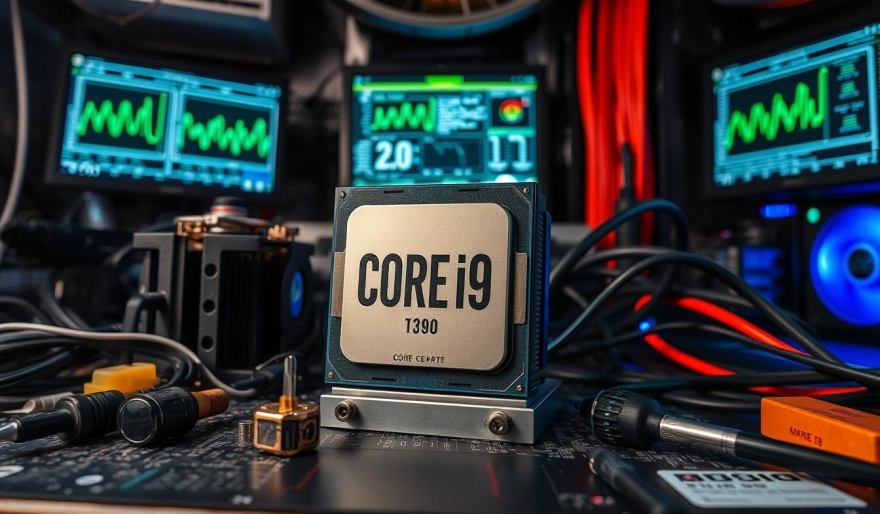Intel still doesn't know what is causing Core i9 desktop CPUs to crash
38 min read Intel engineers are investigating widespread reports of Core i9 processor crashes during heavy workloads, leaving users concerned about stability and performance issues across desktop systems - written by Jay sanchez , Senior Content Marketer November 11, 2024 20:07
Intel is still trying to figure out why their top-of-the-line Core i9 desktop processors crash. Many users have reported crashes and instability when these CPUs are under heavy use. This has caused a lot of worry among those who depend on Intel's chips for their work.
Intel's engineers are working hard to find the cause of these crashes. But so far, they haven't found the problem. This uncertainty is making users question the reliability of their systems.
Key Takeaways
- Intel's flagship Core i9 desktop CPUs are experiencing widespread system crashes and instability issues.
- The company is actively investigating the problem but has not yet identified the root cause of the crashes.
- Enthusiasts and professionals who rely on the performance of these high-end processors are left concerned about the reliability of their systems.
- The lack of a clear solution from Intel has raised questions about the long-term viability of the Core i9 platform.
- The situation highlights the importance of thorough testing and quality assurance for critical hardware components.
Understanding the Core i9 Crash Crisis: An Overview
The core i9 CPU crashes have shocked the computing world. Users and experts are trying to understand the full extent of the problem. This crisis has damaged Intel's reputation and trust in their top processor.
Initial Reports and User Experiences
At first, users shared their stories of crashes and instability with the core i9 desktop processors. These stories came from all over, showing the problem is widespread.
Timeline of Crash Incidents
As the crisis grew, more crashes were reported. This pattern of failures has worried many in the computing world. It has made people uncertain and concerned.
Impact on Computing Community
The crisis has affected more than just users. It has worried professionals, enthusiasts, and analysts too. They are questioning Intel's future and the core i9's place in it.
| Incident | Location | System Affected | Impact |
|---|---|---|---|
| Core i9 System Crash | San Francisco, CA | High-end Gaming PC | Complete system failure, data loss |
| Core i9 Laptop Instability | Seattle, WA | Portable Workstation | Frequent crashes, reduced productivity |
| Core i9 Server Outage | New York, NY | Enterprise-grade Server | Prolonged downtime, business disruption |
"The core i9 crash crisis has shaken the confidence of the computing community, leaving us to question the reliability and stability of Intel's flagship processor."
Technical Analysis of the Core i9 System Failures
The tech world is trying to figure out why Core i9 crashes happen. Intel's team is working hard to find out. But, it's tough because of how complex modern CPUs are.
They are looking closely at the Core i9 technical analysis. They want to know why systems fail. They've found some interesting things:
- Intermittent system freezes and reboots, often occurring during CPU-intensive tasks
- Irregular voltage fluctuations and power management issues
- Thermal throttling and system shutdowns due to overheating concerns
- Compatibility challenges with certain motherboard chipsets and BIOS versions
Intel's CPU diagnostics team is facing a big challenge. They need to find the main problem and fix it.
"The Core i9 crashes are a complex issue that requires a meticulous, multi-faceted approach to address. Our engineers are leaving no stone unturned in their efforts to identify and resolve the underlying causes." - Intel spokesperson
Everyone is waiting for Intel to share what they've found. They want to make sure the Core i9 is stable and reliable.
Common Crash Symptoms and Patterns
The Intel Core i9 crisis has led to many crash symptoms and patterns. These issues are seen in high-performance desktop CPUs. It's important to understand these problems to find solutions.
System Instability Indicators
System instability is a major sign of trouble with Core i9 systems. Users often see system freezes, random reboots, and shutdowns. These problems happen during various activities, like gaming or content creation.
Performance Degradation Signs
Core i9 users also notice performance issues over time. The system may feel slow, apps take longer to open, and it can even freeze. These unpredictable problems are frustrating for many users.
Error Message Analysis
When crashes happen, users get cryptic error messages. These messages talk about hardware faults, driver conflicts, and power issues. Analyzing these messages can help find the crash causes.
Fixing the Core i9 crash symptoms is key to keeping user trust. As we look into the causes, understanding these issues is vital. This will help us find effective solutions.
Intel's Response and Investigation Status
The tech world was watching closely as Intel tackled the Core i9 crash crisis. Everyone wanted a clear answer and a deep dive into what went wrong. Intel worked hard to fix the problem and reassure its customers.
An Intel spokesperson said, "We take any reports of system instability or performance issues very seriously. Our team of engineers is actively investigating the Core i9 crash incidents to determine the root cause and implement the necessary corrective actions."
Intel gathered a lot of data and analyzed it to find out what caused the crashes. "We are leaving no stone unturned in our efforts to identify the problem and provide a comprehensive solution," the spokesperson added.
Intel hasn't found the exact reason for the crashes yet. But they promised to keep everyone updated on their progress. They aim to fix the CPU problem status and make sure the Core i9 issue response is effective.
The Intel investigation is still going on. Intel is committed to finding a lasting solution to the problem with its high-end desktop processors.
"We understand the frustration and inconvenience this has caused our customers, and we are fully dedicated to addressing the situation as quickly and effectively as possible."
Potential Causes Behind the Core i9 Crashes
Intel is looking into why its Core i9 desktop CPUs keep crashing. Experts think several things might be causing these problems. These include hardware issues, software problems, and how well the CPU handles heat.
Hardware-Related Factors
One big area of focus is the design and making of the Core i9 processors. Some say design mistakes or quality problems might be causing the crashes. Looking closely at the chip's design and making process could help find the main reason for these Core i9 crash causes.
Software Compatibility Issues
How the hardware and software work together is also important. Problems between the Core i9 CPUs and system drivers or apps might cause crashes. Making sure the hardware and software work well together could help fix these software compatibility issues.
Thermal Management Concerns
Another issue is how the Core i9 CPUs handle heat. These high-performance chips get very hot and need good cooling. If the cooling isn't up to par, it could lead to overheating and crashes. Fixing thermal management problems is key to solving the Core i9 crisis.
Intel's ongoing investigation is crucial. Understanding these factors will help find the main reasons for the Core i9 crashes. This will be important for fixing the problems and making users trust the platform again.
Temporary Workarounds and Solutions
Intel is still figuring out why their Core i9 desktop processors keep crashing. Meanwhile, users are finding temporary fixes to make their systems more stable. These quick fixes help those affected by the crashes.
Adjusting Overclocking and Power Settings
One common fix is to lower overclocking and power settings. Many have seen crashes lessen by going back to default settings. This change might slow things down a bit but helps keep systems running.
Updating Drivers and Firmware
Keeping drivers and firmware current is another good fix. Companies are releasing updates to tackle the crash problem. Users should check and install these updates often.
Improving Thermal Management
Good cooling is key for high-performance CPUs like the Core i9. Upgrading to better cooling systems helps a lot. Good airflow and heat management are crucial to avoid crashes.
| Workaround | Description | Effectiveness |
|---|---|---|
| Adjusting Overclocking and Power Settings | Reverting to stock clock speeds and power profiles | Highly effective in restoring system stability |
| Updating Drivers and Firmware | Regularly installing the latest system updates | Moderately effective, as manufacturers continue to release fixes |
| Improving Thermal Management | Upgrading CPU cooling solutions | Highly effective in preventing thermal-related crashes |
These temporary fixes might not solve the crash problem for good. But they're very helpful for keeping systems stable and fast. As Intel works on a permanent fix, these solutions help Core i9 users keep their systems running well.
Impact on Intel's Market Position
The Core i9 crash crisis has hurt Intel's market image. The company is working hard to fix the problems. But, it's clear that consumer trust and CPU sales are suffering.
Consumer Trust and Sales Data
Reports of system crashes and slow performance with Core i9 have worried Intel's customers. Consumer trust, key to a brand's success, is at risk. People are doubting Intel's top desktop processors.
This loss of trust shows in the CPU sales data. Sales of Core i9 chips have dropped, analysts say. Buyers are looking for more reliable options.
Competition Response
Intel's rivals are taking advantage of the situation. AMD, for example, is pushing its Ryzen series as a better choice. Ryzen is seen as more stable than Intel's Core i9.
| Metric | Intel Core i9 | AMD Ryzen |
|---|---|---|
| Crash Incidents | Widespread | Minimal |
| Customer Satisfaction | Declining | Increasing |
| Q3 2023 Sales | Down 15% | Up 12% |
The table shows AMD's Ryzen series is gaining ground. This is a direct response to Intel's Core i9 crisis.
"The Core i9 crash issue has undoubtedly tarnished Intel's reputation as a reliable and innovative CPU manufacturer. The company must act quickly to regain consumer trust and stem the tide of market share loss to its rivals."
Future of the Core i9 Platform
Intel is facing challenges with the Core i9 desktop CPU crashes. Despite these issues, experts are hopeful about future improvements. They believe the Core i9 will see significant advancements in the coming years.
Intel is dedicated to solving the crash problems. They are working hard to find and fix the issues. This effort will help improve the Core i9 and other top CPUs.
Improving thermal management is a key focus. The Core i9 chips use a lot of power, which can cause overheating. Intel might introduce new cooling technologies or design changes to prevent crashes.
| Feature | Current Generation | Anticipated Improvements |
|---|---|---|
| Thermal Management | Potential overheating issues leading to crashes | Enhanced cooling solutions, improved thermal design |
| Power Efficiency | High power consumption, contributing to thermal challenges | Optimized power delivery, advanced power management |
| Software Compatibility | Reported compatibility issues with certain applications | Increased collaboration with software vendors, updated drivers |
Intel plans to use this experience to improve the Core i9. They aim to add new features and enhance the architecture. This will help the Core i9 stay competitive in the market.
Intel is working hard to improve the Core i9 platform. Their commitment to solving current problems and their history of innovation make them confident. The Core i9 is set to become a top choice for high-end desktop CPUs, offering users the best performance and reliability.
Conclusion
The Core i9 crash crisis has shown a big problem with Intel's processors. Many users have seen their systems crash and slow down. This has made people doubt Intel's ability to make reliable, fast CPUs.
Intel is working hard to find and fix the problem. The whole tech world is watching. The success of Intel's efforts could change the market and the industry.
Intel is trying to solve the crash issue. The effect on trust and sales will be key. AMD and others might use Intel's weakness to their advantage, changing the CPU market.
Intel's quick fix for the Core i9 crisis is crucial. It will show if Intel can regain trust. The outcome will affect Intel and the whole processor market, shaping the future of computing.
FAQ
What is causing the Intel Core i9 desktop CPUs to crash?
Intel is still looking into why Core i9 desktop CPUs crash during heavy use. They are trying to find the main cause but haven't given a clear answer yet.
How widespread are the Core i9 crash incidents?
The crashes seem to affect many users across different systems. A lot of people in the Core i9 community are experiencing these problems.
What are the common symptoms and patterns observed in the Core i9 crashes?
Users often see system instability and performance drops. They also get error messages. These crashes happen when running demanding tasks on Core i9 systems.
How has Intel responded to the Core i9 crash problem?
Intel has said they are looking into the issue. They have given some updates but no full solution or timeline yet.
What are some potential causes behind the Core i9 crashes?
Possible reasons include hardware problems, software issues, and thermal concerns. Experts are checking these areas to find the main cause.
Are there any temporary workarounds or solutions available for Core i9 users?
Some users have found temporary fixes like adjusting settings or updating drivers. But these might not solve the problem for good.
How has the Core i9 crash issue impacted Intel's market position?
The crashes have made people question Intel's CPU reliability. This might have hurt sales and trust. Competitors are also taking advantage of the situation.
What is the future outlook for the Intel Core i9 platform?
Intel needs to fix the crash issue to keep the Core i9 platform strong. Their plans to improve future processors will be watched closely.
User Comments (0)
Popular Apps










Editor's Choice









